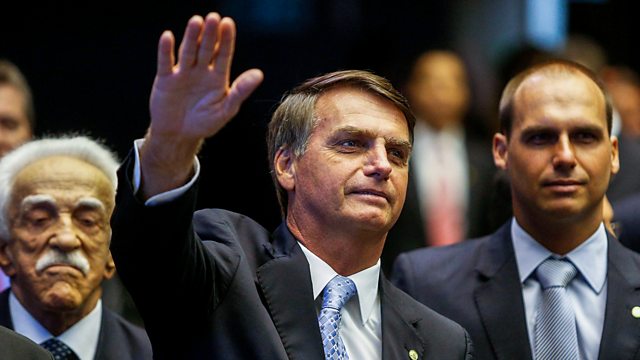Episode 1
Bolsonaro makes a remarkable rise from the political fringe to the edge of presidential power. He uses controversy and the power of television to lead a political insurgency.
Episode 1 tells the story of Bolsonaro’s remarkable rise from relative poverty and obscurity to becoming a candidate to be president of Brazil in 2018. It explores how a cocktail of controversy and shock, combined with the growing power of television, turned a fringe politician, famous for little more than his offensive views, into a serious contender to lead the most powerful country in Latin America. With his sons at his side, Bolsonaro led an extraordinary political insurgency that showed once again, the growing appeal of right-wing populism around the world.
The son of an 'amateur dentist', Bolsonaro grew up in relative poverty in the town of Eldorado – a rural backwater south of São Paulo – during the years of Brazil’s military dictatorship. On leaving school, he entered the elite military academy in Rio de Janeiro where he trained as a parachutist and rose to the rank of captain. During his time in the army, Bolsonaro seemingly absorbed the values that would stay with him throughout his life: his hatred of communism, a respect for force, and a disdain for democracy. Even though the military regime murdered and tortured its political opponents, for Bolsonaro, this was a golden age: in his mind, it was a time when the country repelled the threat of communism, the streets were safe, and the economy was booming.
In 1978, Bolsonaro married his first wife: Rogéria Nantes Braga, with whom he had three children: Flávio, Carlos and Eduardo. Always at his side, they would become key to his political rise.
During his 15 years in the army, Bolsonaro gained a reputation as a rabble-rouser. Following a campaign for higher salaries for soldiers, he was forced to leave the army and decided on a career in politics, first as a local councillor in Rio, and two years later, as a deputy for Brazil’s national Congress. Bolsonaro would serve an incredible seven terms, but he was never taken seriously by most other politicians. While most of Brazil embraced the return to democracy in 1985, Bolsonaro attacked it and defended the record of the past military regime. His staunch support for the dictatorship gained him a reputation as a one issue politician and a bit of joke among his political opponents in Congress.
Spending most of his time away in Rio, Bolsonaro’s political career eventually took a toll on his marriage. He had an affair with a congressional assistant, Ana Cristina and had a child with her. Rogéria subsequently filed for a divorce.
The election of the socialist President Lula da Silva in 2002 would transform Brazil. A leftist former trade unionist, Lula embarked on social programmes that lifted millions of people out of poverty and championed liberal causes such as gay rights and the protection of the Amazon and its indigenous population.
For Bolsonaro, it was a betrayal of everything he stood for. Lula’s espousal of liberal causes, particularly his support of LGBT rights, gave Bolsonaro a political opportunity to widen his base. Entranced by Lula’s success, few politicians openly espoused the views of the millions of conservative Brazilian voters who were horrified by Lula’s liberal reforms, with one exception: Jair Bolsonaro.
Using television as his principal medium, Bolsonaro became the voice of socially conservative Brazil. His increasingly offensive and controversial statements on gay and gender rights, crime, and democracy turned him into a favourite of TV talk shows looking for controversy and allowed him to start building a more national profile.
Yet, while Bolsonaro was now the voice of the traditional family, his own family life was anything but conventional. He left his second wife and married his third, Michelle, also a young Congressional assistant. She would become a key electoral asset in later years.
In 2014, Brazil was rocked by the biggest corruption scandal in Latin American history. Known as the Carwash, it led to hundreds of politicians and officials being investigated for bribery as part of a mass kickback scheme for public works contracts. Bolsonaro was one of the few politicians not implicated in the scandal. He became a vocal critic of what were seen as the corrupt elites who had dominated Brazilian politics since the restoration of democracy. A Brazil increasingly angry with the corruption of established politicians and their political parties began to turn to the lifelong outsider, Bolsonaro, as an alternative. In 2016, Bolsonaro announced he would run for the Presidency of Brazil in 2018.
He had come a long way. Yet most people’s reaction to his candidacy was one of laughter: It seemed implausible, even to his most ardent supporters, that he had any chance of victory.
Last on
More episodes
Previous
You are at the first episode
Next
See all episodes from The Boys from Brazil: Rise of the Bolsonaros
Music Played
-
![]()
Lalo Schifrin, Salaam Remi
Main Title - Rush Hour Theme
Credits
| Role | Contributor |
|---|---|
| Narrator | Nina Sosanya |
| Executive Producer | Ricardo Pollack |
| Series Producer | Raquel Toniolo |
| Producer | Laura Coquereau |
| Director | Matthew Hill |
Broadcasts
- Mon 5 Sep 2022 21:00
- Wed 7 Sep 2022 23:45
- Sun 18 Sep 2022 23:30Â鶹ԼÅÄ Two except Wales & Wales HD
Featured in...
![]()
New and Trending
Latest releases on iPlayer
![]()
The Battle for Power
Exploring the lives of politicians and powerful figures, and their tumultuous times.
![]()
Thought-provoking Global Stories
Learn more about the world we live in with these thought-provoking documentaries.
![]()
Power Politics
Exploring the lives of politicians and powerful figures, and their tumultuous times.



